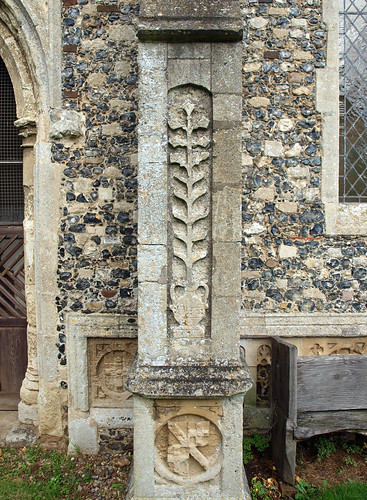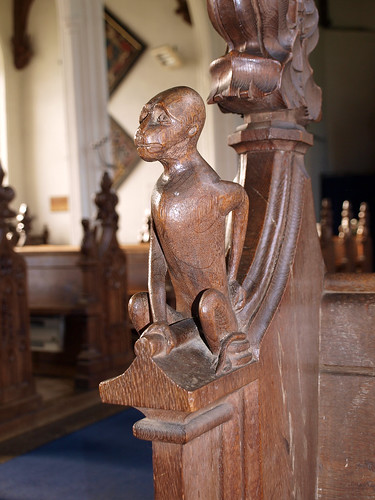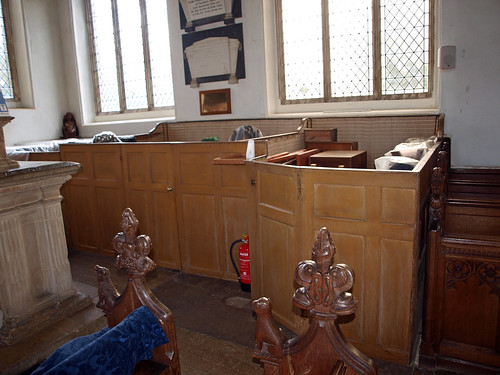To top it off an unexpected family tree connection to the Sulyards and the addition of John Sulyard's monument to the tree. Altogether sublime my only criticism being that the south aisle box pews have been turned in to a dumping ground for the church detritus making the two monuments hard to photograph.
ST MARY. Dec W tower and Dec chancel with an E window which has reticulated tracery and a niche over. Inside it has niches l. and r. The Piscina is contemporary too. The rest is Perp, i.e. the other windows of the chancel, the Treasury or Vestry N of the chancel with a curious heavy half-tunnel-vault with closely set single-chamfered ribs, the tower doorway and the window above it, the N side of the nave, and the spectacular S aisle and S porch. The two latter were built by Sir John Sulyard c. 1484. The porch is attached to the W end of the aisle and forms part of it. Base with a frieze of shields and flushwork panelling. Also a frieze of shields above the entrance. Among the flushwork is a lily in a vase (buttress between porch and aisle). The S arcade inside is Perp too, with capitals only to the shafts towards the arch openings. Double-hamerbeam roof, the hammer-posts and upper hammerbeams being false. Three-tier decorated wall-plate. Figures (not original) on the pendants. The aisle roof has cambered tie-beams and figures at the springing of the arched braces. - PULPIT. Perp panels are used. - SCREEN. Fragments of the dado re-used behind the altar. - BENCHES. With poppy-heads and, on the arms, beasts and birds. Carved backs of the seats. - BOX PEWS in the S aisle.- STAINED GLASS. E Window by H. Hughes, 1863; bad. PLATE. Cup and Cover c. 1680; Set C18.- MONUMENTS. Tomb-chest with three lozenges with shields. Not in a good state. - Sir John Suliarde (Sulyard) d. 1574. Tall tomb-chest with fluted pilasters and shields. On it a stone panel with a framed shield with foliage flanked by two columns. Below the panel four small kneeling figures, Sir John and his family. Not a convincing composition. As a rule such monuments as this have no figures at all.
WETHERDEN. For its fine old limes round the church it has to thank an 18th century vicar who planted them; and for part of the church itself it is grateful to Sir John Sulyard, a forgotten Chief Justice of Richard the Third’s time. He built the porch and the aisle where his family were laid during four centuries, and on both appear his arms on stone shields. Both porch and aisle have a very effective frieze of little narrow arches. The tower is 15th century too, and has three beautiful canopied niches by the west door. The 14th century chancel has one also, over the east window outside. The little vestry is interesting because it was once a chapel and has a vaulted roof and a piscina. It is only seven feet by five.
The 15th century nave is adorned with handsome woodwork, the richly carved roof having double hammerbeams and two rows of angels on each side. Some of the seats are modern copies, but many of the old ones are left, with beautiful traceried ends and fine poppyheads. On the elbows are perched such curious sights as monkeys eating, horses licking their backs, squirrels with nuts, a bird putting its head into an animal’s mouth, a pair of lions, delightful dogs, and two beasts with long horns. Very different these seats are from the high box-pews in the aisle. The font was carved 500 years ago, and its bowl rests on eight heads which have the pointed ears of devils though their features are human and refined.
There is a notable monument to one of Wetherden’s old family who died in 1574, an altar tomb with coats-of-arms, marble columns, and the mutilated figures in relief of John Sulyard kneeling in armour and his three wives kneeling behind him with their children. One of the Sulyards built Wetherden Hall, still carrying on as a farm.
The 15th century nave is adorned with handsome woodwork, the richly carved roof having double hammerbeams and two rows of angels on each side. Some of the seats are modern copies, but many of the old ones are left, with beautiful traceried ends and fine poppyheads. On the elbows are perched such curious sights as monkeys eating, horses licking their backs, squirrels with nuts, a bird putting its head into an animal’s mouth, a pair of lions, delightful dogs, and two beasts with long horns. Very different these seats are from the high box-pews in the aisle. The font was carved 500 years ago, and its bowl rests on eight heads which have the pointed ears of devils though their features are human and refined.
There is a notable monument to one of Wetherden’s old family who died in 1574, an altar tomb with coats-of-arms, marble columns, and the mutilated figures in relief of John Sulyard kneeling in armour and his three wives kneeling behind him with their children. One of the Sulyards built Wetherden Hall, still carrying on as a farm.



No comments:
Post a Comment